The rapid development in solar technology, combined with increasing concerns about the environment and rising electricity costs, has led to a surge in the adoption of residential solar panels. With numerous manufacturers offering a wide array of products, the task of choosing the right solar panel can be daunting. This article aims to help you make an informed choice by highlighting the best residential solar panels available in 2023, discussing the factors you need to consider when purchasing, and explaining how to take advantage of incentives and payment options.
The solar market is replete with a variety of solar panels from various manufacturers. Here, we’ve laid out some of the top five contenders in the residential solar market, based on Forbes and MarketWatch:
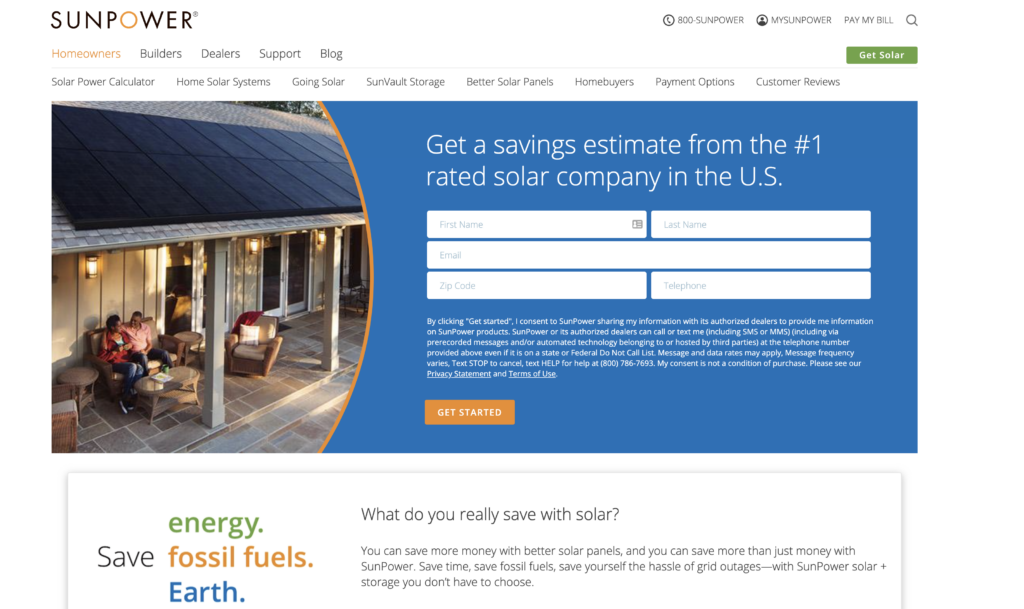
SunPower has been an industry trailblazer for over three decades, and its solar panels, renowned for their exceptional efficiency (20.9%-22.8%), are among the market’s best. The company’s dedication to innovation, quality, and sustainability has made it a preferred choice for residential solar installations.
Key Features:
Pros: High efficiency, industry-leading innovation, robust 25-year product warranty, operates across all U.S. states.
Cons: The high quality of their panels comes at a premium, making their products more expensive than those of some competitors.
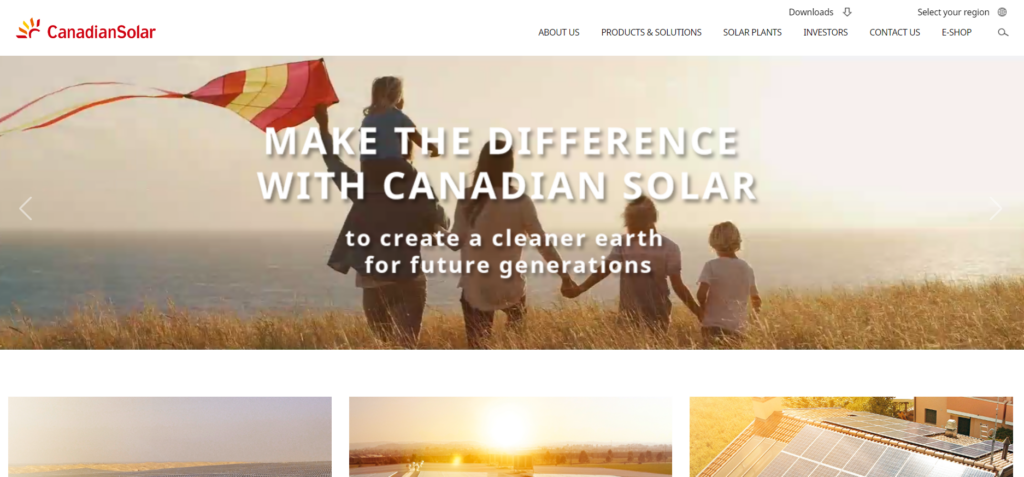
Canadian Solar has made a name for itself by offering high-efficiency solar panels at affordable prices. They strike an appealing balance between power, efficiency, and cost, making them a popular choice for many homeowners.
Key Features:
Pros: They offer an array of panel types, both polycrystalline and monocrystalline, making them suitable for different budgets and roof sizes. Their panels are designed to endure heavy snow and low temperatures, thus ensuring durability.
Cons: Product warranties are shorter compared to other top brands, the efficiency of their panels may decline in hotter weather conditions.
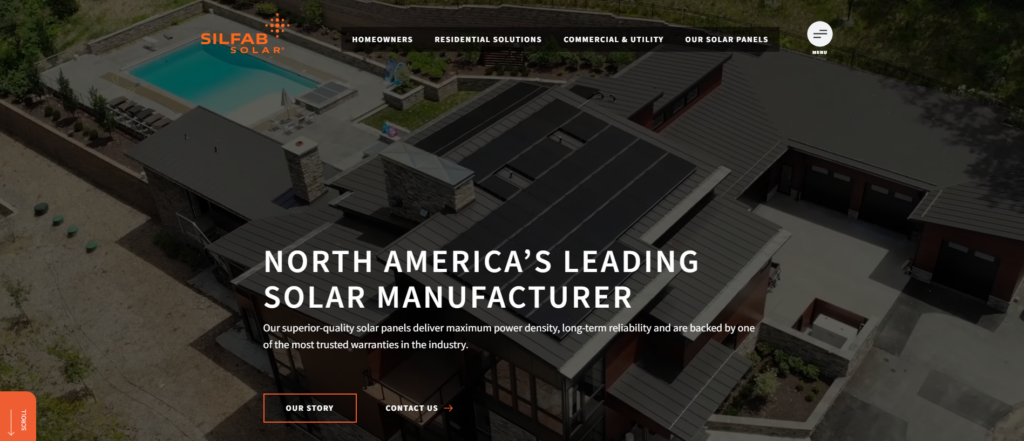
Known for its North American-made high-efficiency solar panels (18.9% to 21.4%), Silfab Solar offers products that are both high-performing and durably built. Their superior warranty coverage further enhances their appeal to homeowners.
Key Features:
Pros: They guarantee the longest panel production time among the manufacturers listed.
Cons: Their efficiency ratings do not match up to some of their competitors.
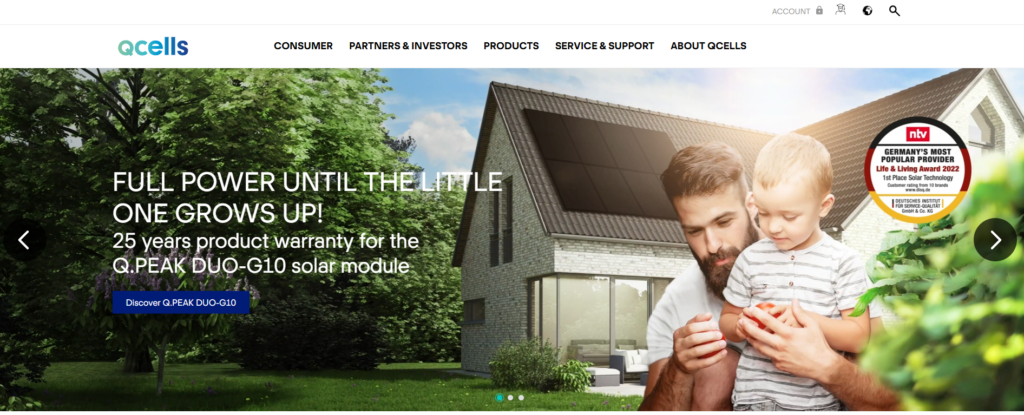
QCells stands out for its efficient and durable panels, especially lauded for their performance in low-light conditions. This makes them an excellent choice for regions with less sunny days.
Key Features:
Pros: Their panels exhibit low degradation rates, ensuring sustained high performance over time. Their panels are designed to excel in low-light conditions, strike a balance between durability, efficiency, and cost-effectiveness.
Cons: Compared to other high-efficiency panels, QCells have slightly lower efficiency ratings. Some of their models offer a product warranty of only 12 years.
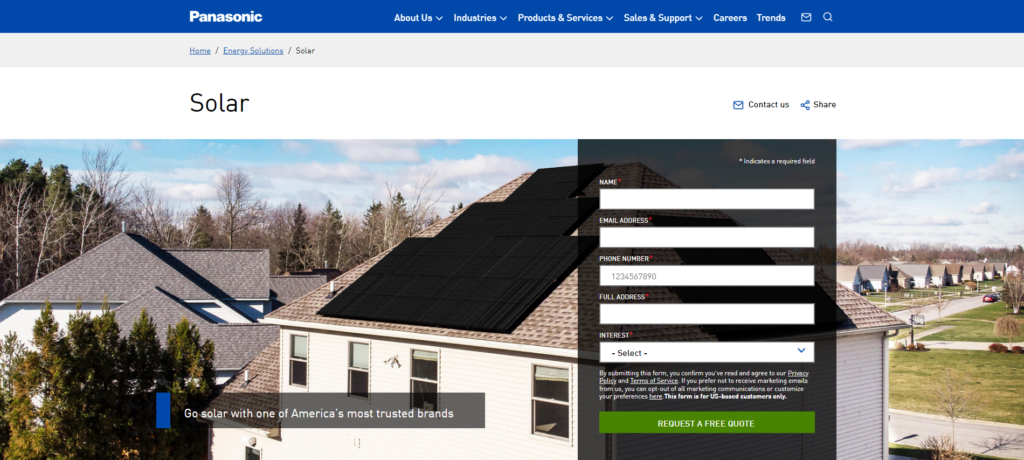
Panasonic’s solar panels are widely recognized for their long-lasting performance and minimal degradation over time. This strong durability, coupled with their efficient performance, makes Panasonic a reliable choice for residential solar power.
Key Features:
Pros: Their solar panels, with one of the lowest annual degradation rates at 0.26%, are renowned for their durability. They offer a comprehensive 25-year warranty that includes performance guarantee, equipment, parts, and labor costs.
Cons: Their panels are more costly than those of many competitors. They have been outsourcing their solar panel manufacturing since March 2022.
A common question many homeowners ask when considering a switch to solar power is, “How many solar panels will I need for my home?” The answer to this is determined by several factors that influence the overall solar energy system’s design and efficiency:
Dimensions: Generally, a residential solar panel measures approximately 65 inches by 39 inches. These measurements can vary slightly from one manufacturer to another. To help visualize, each panel is roughly the same size as a 75-inch television or a twin-size mattress.
Wattage: Solar panels differ in the amount of wattage they can produce, and panels that generate more wattage tend to be more expensive. Over time, a solar panel’s efficiency will decrease, but premium panels maintain higher efficiency levels for longer, continuing to produce energy even beyond their warranty period.
Energy Consumption: The number of panels you’ll need also depends on your household’s energy usage. On average, a home uses about 1,200 kWh per month. This consumption history, typically found in your electricity bill or by contacting your utility provider, will be a significant factor in determining the size of your solar power system.
Storage Options: If you wish to store surplus energy produced by your solar panels, you’ll need to consider a solar battery. Having stored energy can be highly beneficial during peak hours, power outages, or times of low solar production.
Roof Size and Shape: Your solar installer will conduct an assessment of your roof to decide the optimal placement of the panels. If your roof has a unique shape or areas prone to shade, the installation design may need adjustments to ensure you obtain maximum efficiency from your solar panels.
Shade and Average Sunlight: The natural shade around your home and the average sunlight your location receives also play a vital role in determining the number of solar panels you need. More sunlight and less shade typically mean you can generate more solar power.
Remember, an experienced solar installer can help you determine the precise number and type of solar panels required, based on your specific goals and needs. It’s important to note that solar panels don’t necessarily need to be installed on your roof. Some homeowners may opt for ground installations, especially in larger-scale installations or properties with vast open spaces. However, this option is more common in commercial settings like solar farms.
The cost of solar panels in 2023 can be influenced by a myriad of factors, making it essential to understand what might affect the final price. These variables can include the specific manufacturer, the efficiency level of the panels, and the scale of your proposed installation. Different manufacturers offer varying price points based on their technology, reputation, and warranty offerings. Panel efficiency also significantly impacts cost; more efficient panels usually carry a higher price tag due to their increased ability to convert sunlight into electricity. The size of the installation will also impact your overall cost – a larger system necessitates more panels, increasing the overall price. Given these varying factors, the price range can fluctuate widely. In 2023, the cost per watt of solar panels is generally estimated to be between $0.60 and $4.50. It’s important to take these elements into account when planning your solar installation to ensure you can budget effectively for your renewable energy goals.
Deciding whether to include a solar battery in your home solar setup is largely dependent on your individual needs and circumstances. A solar battery can certainly be a beneficial addition as it allows you to store surplus energy generated by your solar panels. This stored energy can be used during peak electricity usage hours, power outages, or times when solar production might be lower due to weather conditions.
However, it’s crucial to weigh this advantage against the cost. Currently, solar batteries can be quite expensive, with prices ranging from $12,000 to $22,000. This cost is comparable to that of an entire solar panel system, making the decision to invest in a battery a significant one. Certain situations may indeed warrant the investment in a solar battery. For instance, if you’re living in an off-grid home, a battery becomes essential to utilize the solar energy your panels are generating. Similarly, if your region frequently experiences power outages, or if you have specific medical needs that require constant electricity (like refrigeration for certain medications or medical equipment), investing in a solar battery could prove to be a sensible decision.
It’s worth mentioning that as the solar industry continues to advance, the cost of solar batteries is likely to decrease, making them more accessible for more homeowners. Therefore, if a solar battery doesn’t seem like the right choice for your current situation, it might be worth revisiting the option in the future as the technology and market continue to evolve.
Energy Independence: Solar panels allow you to generate your own electricity, reducing dependence on the grid.
Environmentally Friendly: Solar energy is a renewable source that produces no greenhouse gases.
Cost Savings: Though the initial investment might be high, solar anels can significantly decrease your energy bills. In some cases, they may even earn you money if your system produces excess energy that you can sell back to the grid.
Increases Property Value: Studies have shown that homes equipped with solar energy systems have higher property values and sell more quickly than non-solar homes.
Low Maintenance: Solar panels require minimal maintenance. Once they are installed, you only need to keep them relatively clean and check the inverter occasionally.
High Upfront Costs: The initial cost for purchasing and installing solar panels can be substantial, even though these costs can be recouped over time through energy savings.
Intermittent Energy Production: Solar panels depend on sunlight, which means they produce no power during the night and less on cloudy days.
Energy Storage Is Expensive: If you want to store the energy produced during the day for use at night, you’ll need to invest in a solar battery system, which can be costly.
Aesthetics: Not everyone finds solar panels aesthetically pleasing. Depending on your home’s design, solar panels may detract from its appearance. Requires
Space: Solar panels require a good amount of space. The amount of power you can generate is directly tied to the number of solar panels you can install.
Transitioning to solar energy involves a significant initial investment, but several payment and financing options exist to make this switch more affordable. These options have been made even more accessible thanks to the federal tax credit that covers 30% of the cost. One of the most straightforward methods is paying out of pocket for the entire project, upon which homeowners can then claim the tax credit to get a portion of their money back. However, not everyone can afford this upfront cost. Alternatively, homeowners can explore affordable solar financing options. Several plans offer a low 1.99% APR over 25 years, which can still result in a significant tax credit. Do note that interest rates have been fluctuating, and it’s wise to compare different offers to find the terms best suited to your financial situation.
Bank loans or home equity loans are other possibilities, but they usually come with higher interest rates, so they should be considered with caution. For those unable to purchase or finance a system outright, there are options like solar leases and power purchase agreements (PPAs). A solar lease works similarly to a vehicle lease—you pay a set monthly fee for a system that remains the property of the installer. With a PPA, you pay a fixed rate for the energy produced by the solar panels, not for the system itself. This rate may increase over time. The disadvantage of these options is that you won’t own the solar panels and therefore won’t qualify for any tax credits or have the option to sell renewable energy certificates. Check out our full guide on solar financing.
The federal residential solar energy credit is a significant incentive for homeowners considering the switch to solar power. This credit provides a 30% rebate to homeowners who install solar panels on their home through 2032. For instance, if your entire solar project costs $30,000, you’ll be granted a tax credit of $9,000. This credit applies to homeowners who purchase a system either with cash or through financing.
To claim this credit, according to the Office of Energy Efficiency & Renewable Energy, you should seek professional tax advice to ascertain your eligibility. Once confirmed, you can claim the credit by filling out IRS Form 5695 as per the IRS’s instructions. By understanding and taking advantage of these options and incentives, homeowners can make the transition to solar power more accessible and financially manageable. Check out our full guide on solar energy incentives.
Switching to solar energy is more than just a financial investment; it’s an investment in a more sustainable future. Despite the varying costs and considerations, the benefits are substantial. Solar energy provides homeowners with the chance to become energy independent, cut down on electricity costs, and significantly reduce their carbon footprint. Moreover, with various financing options and incentives available, solar power has become more accessible than ever before. This guide offers an essential starting point, but every homeowner’s situation is unique. Thoroughly researching your needs, consulting with a professional installer, and understanding your local solar market will help ensure you make the most of your transition to solar energy.
There are multiple financing options available, including solar loans with low APR, bank loans, home equity loans, and solar leases.
There are several incentives available such as the federal solar tax credit which grants a 30% credit to homeowners who install solar panels.
The efficiency of top residential solar panels in 2023 ranges from around 18.5% to 22.8%.
Stay a while and read more posts like this
In recent years, Europe has witnessed a remarkable surge in the adoption of solar panels, marking a pivotal shift towards renewable energy. Data from the...
Renewable Energy, Solar Energy, Solar Energy Basics, Solar Technology
“Unlock the Truth: Get the Facts on Solar Energy!” Introduction Solar energy is becoming increasingly popular as a renewable energy source, but there are...
Imagine a world where you’re able to cut your monthly energy expenditure substantially. A reality where your home isn’t reliant on finite,...